China has acknowledged — and justified — the Tiananmen crackdown in remarks geared at foreign audiences. The English edition of the state-run Global Times tabloid called the handling of Tiananmen and its aftermath “a political success” in an editorial published Monday. “As a vaccination for… Chinese society, the Tiananmen incident will greatly increase China’s immunity against any major political turmoil in the future,” it said, AFP reports:
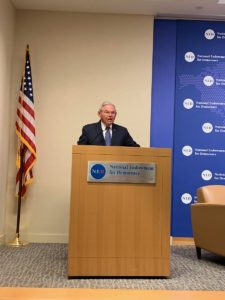 Robert Menendez (right), the top Democrat on the Senate Foreign Relations Committee, said that the United States needed to look inward and be more consistent on human rights as it tackled China’s record.
Robert Menendez (right), the top Democrat on the Senate Foreign Relations Committee, said that the United States needed to look inward and be more consistent on human rights as it tackled China’s record.
“Unlike 30 years ago, when America stood with the brave Chinese people in the face of repression, we hear deafening silence from the White House at best and voices fanning the flames at worst,” Menendez told a Tiananmen commemoration event at the National Endowment for Democracy (above).
“Without a strategy we risk China remaking the developing world in it’s own authoritarian image,” he added. “Democracy will not defend itself. We must defend democracy.”
“Merely being more confrontational with China won’t make us more competitive. Simple confrontation won’t resolve our human rights concerns,” said Menendez. “We must cultivate robust diplomatic & security partnerships. It starts with re-grounding China policy in our values.”
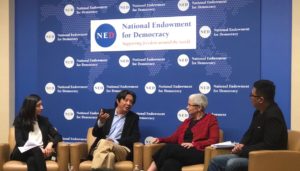 A comprehensive review of the CCP’s post-Tiananmen survival strategy and the people’s enduring tradition of civil resistance in China features in a new Project 2049 report, Regime Resilience and Civil Resistance in Post-Tiananmen China by Yang Jianli and Han Lianchao:
A comprehensive review of the CCP’s post-Tiananmen survival strategy and the people’s enduring tradition of civil resistance in China features in a new Project 2049 report, Regime Resilience and Civil Resistance in Post-Tiananmen China by Yang Jianli and Han Lianchao:
While the Party’s methods of quelling civil dissent have strengthened in the decades following Tiananmen, the authors identify elements of growing discord in the PRC. Through an evaluation of the perseverance of civil resistance in China, the authors conclude the people’s ongoing struggle against the authoritarian Chinese Communist Party apparatus is far from over.
Divisions within the ruling elites and economic slowdown confirming the regime’s lack of performance legitimacy will inform future prospects for democratization, the authors contend.
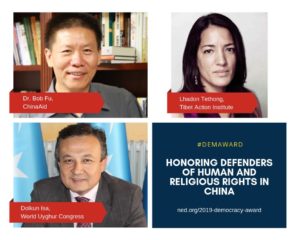 In the struggle between communism and freedom, the West has no more powerful weapon than human rights, argues Marion Smith, executive director of the Victims of Communism Memorial Foundation. The Global Magnitsky Act of 2016 provides wide latitude to accomplish this goal, yet no Chinese officials or entities have yet been listed. The U.S. should target the surviving top perpetrators of the June 4 massacre as well as those behind China’s current atrocities. Congress can also swiftly pass the Uyghur Human Rights Policy Act, he writes for The Wall Street Journal.
In the struggle between communism and freedom, the West has no more powerful weapon than human rights, argues Marion Smith, executive director of the Victims of Communism Memorial Foundation. The Global Magnitsky Act of 2016 provides wide latitude to accomplish this goal, yet no Chinese officials or entities have yet been listed. The U.S. should target the surviving top perpetrators of the June 4 massacre as well as those behind China’s current atrocities. Congress can also swiftly pass the Uyghur Human Rights Policy Act, he writes for The Wall Street Journal.
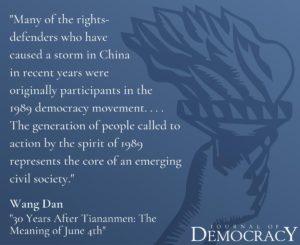 “Like the Tiananmen mothers, those who cherish freedom must work to dispel Beijing’s lies,” he adds.
“Like the Tiananmen mothers, those who cherish freedom must work to dispel Beijing’s lies,” he adds.
China’s 1989 democracy movement planted the seeds for the growth of Chinese civil society and for future democratization, former student leader Wang Dan asserts in the Journal of Democracy’s April issue.
ChinaFile put out a call for young people who grew up in China to describe how they first learned about the Tiananmen Square protests and massacre, and how they felt about it. It has published a selection of the responses, including several from authors who requested their posts be published anonymously.
The lessons of the post-1989 democratization wave have changed over time, argues analyst Seth J. Frantzmann:
What we thought was a one-way street towards more freedom and democracy has been challenged not only by authoritarian leaders, but also by voters who see in too much democratization a challenge to tradition, stability, religion and nationalism. The erosion of democracy in countries such as Turkey and Venezuela also shows that even when democracy takes shape, it can be slowly pushed aside.
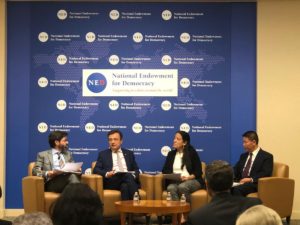
In a statement marking the anniversary – and tying the Tiananmen Square crackdown to Beijing’s current human rights policies – the Washington-based Uygur Human Rights Project called for “an end to the abnormality of the Communist Party’s denialism through concerted action,” The South China Morning Post adds.
“If there is one lesson we must learn from Tiananmen Square, it is that we must not permit China to conceal its crimes against humanity,” said Omer Kanat, the group’s director.
The NED’s Brian Joseph led a panel (above) on ‘Challenging China’s Repression Model’ with the honorees of the 2019 Democracy Award – Dolkun_Isa of the World Uyghur Congress, Bob Fu of China Aid and Lhadon Tethong of the Tibet Action Institute.
@wangdan1989 @Dolkun_Isa @BobFu4China @chinaaid @lhadon @tibetaction #Tiananmen30 #







